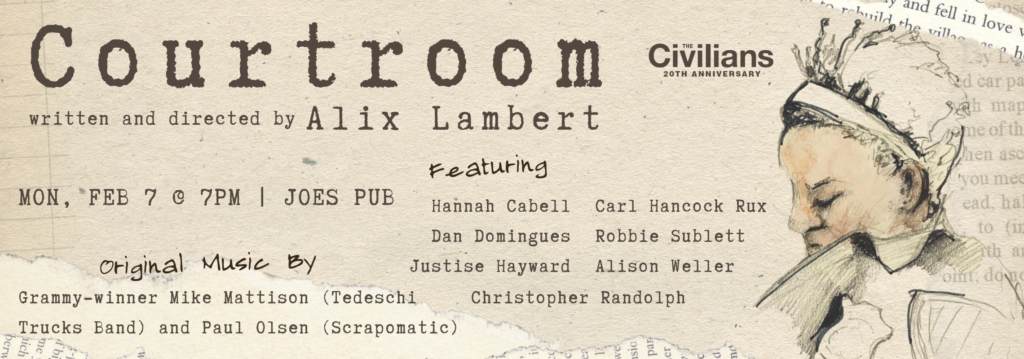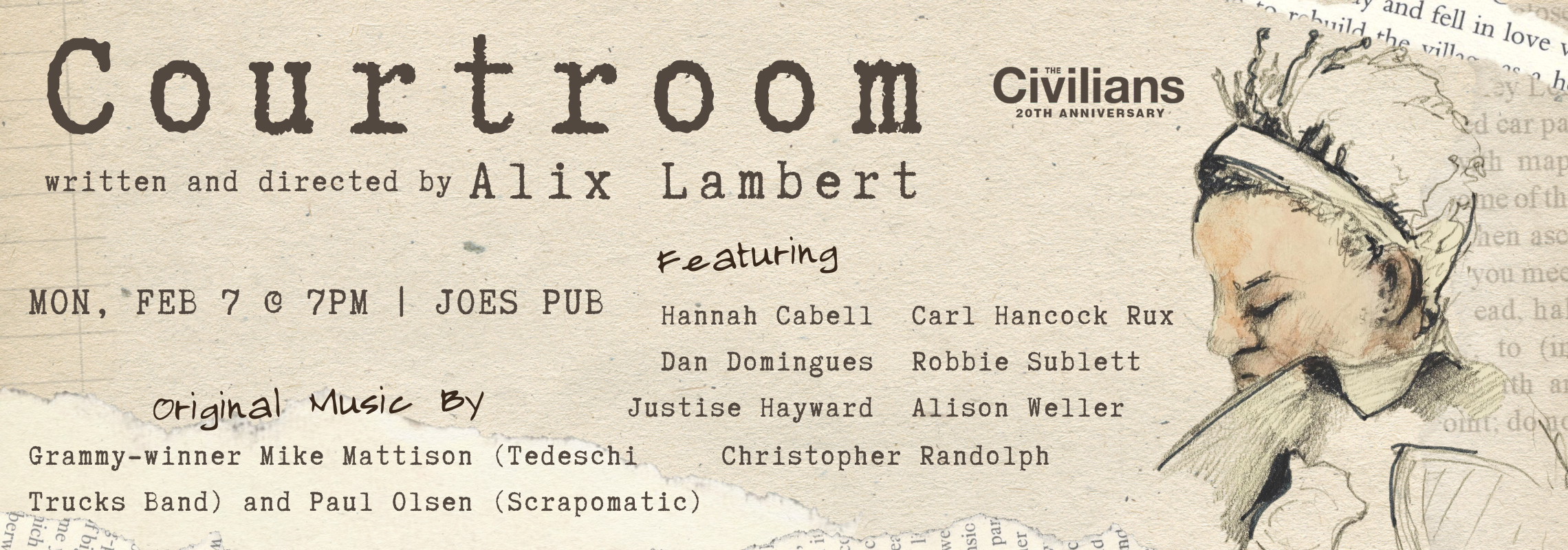“There is, of course, theater within the courtroom. The lawyers are performing for the jury and the judge. Whoever tells the best story wins.” As the first laughs of the evening ring out during Alix Lambert’s new piece, COURTROOM, this moment from my recent interview with her clung to the back of my mind. COURTROOM, which performed at Joe’s Pub on February 7th, is an investigation into the courtrooms of America made up of poetry, music, and interviews that first appeared in her book of courtroom drawings and true courtroom accounts of the same name.
The show opens outside of the courtroom, on a poem by poet and attorney Martín Espada about his encounter with a racist taxi driver on the Mystic Tobin Bridge, performed by Dan Domingues. The poem illustrates the prejudices that will follow the writer from this cab into the courtroom as he leans into what the driver must think of him, framing the true accounts of lopsided justice that are about to come.

The show that follows is a series of five accounts from real life experiences within America’s courtrooms, led by narrator Justise Heyward, each connected through songs by composers Mike Mattison and Paul Olsen. The interviews Lambert has chosen to pull for this piece, performed by Hannah Cabell, Christopher Randol, Jordan Mahome, Robbie Sublett, and Alison Weller, span point of views throughout the system – a gay housing court judge, a man whose father was a famous courtroom artist, a man who has found himself perpetrator and victim of near-unbelievable criminal hijinks, a woman whose father was murdered when she was a child, and a Black Panther and member of the Angola Three, kept in solitary confinement for over 40 years. These five players’ stories are split up and arranged so that the speakers are interrupting each other’s monologues with their own, allowing the piece an intense range of motion that leads to moments such as one man’s comic description of stealing money from the cash register with his friends as a sixteen-year-old being interrupted by the sentence, “I was sixteen when my father was murdered.”
The simplest word to describe these interview segments is “testimony.” Listening to the audience react throughout the performance, it’s hard not to draw the comparison as their stories are told in full detail to appease the jury currently seated in Joe’s Pub. In that sense, Lambert has created an experience in which you are asked to pass judgement on a case against the American judicial system, with her interviewees standing as witnesses. The stories Lambert has collected are simultaneously riveting, bleak, and hilarious, and paint a full portrait of the ways the courtroom can move for and against you.
This portrait is completed by Mattison and Olsen’s music, a series of songs following the court proceedings from formation to verdict. These songs are played over a slideshow of pages from Lambert’s notes and drawings taken during her own journey into America’s courtrooms, along with official court documents and transcriptions. The pages flash across the screen above the stage so briefly that it’s hard to make out more than a sentence or two of the words printed on them – “Do you understand?” “Identify.” “Crime numbers contest beliefs.” “He didn’t have the firearm.” “This defendant is in court without counsel.” “The attorney is not coming.” It’s an ever-shifting flow of information that refuses to explain itself, which, in combination with the music, displays both the confusion of being on the receiving end of the courtroom’s justice and the onslaught of depersonalized cases the judge described facing early-on in the piece. These moments tie together with the interviews around them to ask an essential question – of all of these people who have found themselves in the courtroom, how many of them have received justice?
You can see more of Alix Lambert’s investigations here and read our interview with Alix ahead of COURTROOM here.
Extended Play is a project of The Civilians. To learn more about The Civilians and to access exclusive discounts to shows, visit us and join our email list at TheCivilians.org.
Author
-

Phoebe Corde (she/her) is a dramaturg, writer, and illustrator from Westport, Connecticut, specializing in stories of the strange, magical, and otherworldly. She is currently Resident Dramaturg at The Civilians, where she is director of their artistic development group, the R&D Group, and is a member of the creative board of directors at Off-Brand Opera. Her dramaturgical work has been seen on Broadway and Off-Broadway stages, including The Public Theater, Vineyard Theatre, A.R.T., Paper Mill Playhouse, Oregon Shakespeare Festival, Ensemble Studio Theatre, and 59E59.
View all posts









